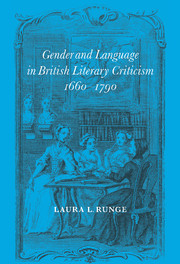3 - Paternity and regulation in the feminine novel
Published online by Cambridge University Press: 15 September 2009
Summary
The birth and development of the novel as a genre takes place in the full light of the historical day.
BakhtinThe possibility that the novel might have a recoverable history impels an irresistible search for its origins in eighteenth-century literary discourse. One great paradox is that the flourishing investigation of the novel creates an instrument of academic power around a genre that was negligible before the 1740s. Within the literary hierarchy of eighteenth-century criticism, the novel occupies a low, if not anomalous, position as a new and unfixed literary form. In the contest of literary values that were debated throughout the period – Ancient vs. Modern, Classic vs. Romantic, Augustan vs. Sentimental – the aesthetic of narrative fiction does not enter as a serious factor. The elite culture accords little merit to the art of realistic narrative until the middle of the nineteenth century. Prior to the achievements of Fielding and Richardson, criticism of the novel rarely identifies a clear formal purpose for the genre but is instead involved in an emphatically gendered discourse on reading, writing, and marketing of texts. As with Dryden's contemporaneous criticism, the critical prose that describes or promotes early fiction relies on gendered distinctions, but, contrary to expressions that celebrate the “manly” epic or tragedy, the writings on fiction focus on the feminine.
Given the authority of masculine heroic values in early critical discourse, the relative insignificance of the novel before 1740 and its pronounced femininity is hardly a surprising or innocent coincidence.
- Type
- Chapter
- Information
- Gender and Language in British Literary Criticism, 1660–1790 , pp. 80 - 120Publisher: Cambridge University PressPrint publication year: 1997

